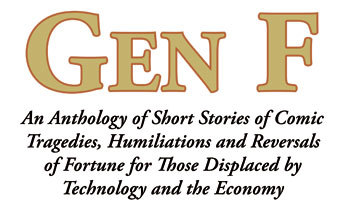My scribbled notes read, "We are now one, whether you like it or not. We are all Generation F." I needed to find an angle or a summary. How do we define our times?
I have been editing an anthology of 33 works by 30 writers on a topic that attempts to define our times. Gen F is a collection of short stories, an ensemble of comic tragedies and humiliations, for those displaced by a reversal of fortune, the toxicity of failure, psychological downsizing, class disparity, vanished industries, outsourscing, mortgage collapse, bank bailouts and stimulus recovery for the wealthy.
As editor, I am expected to whip out a cheery introduction to the gloom. How do you define these times? Why go there? No fun in that. There are a million happier things I'd rather be thinking about.
I wiped the tears from my eyes, took a deep breath and dug into my reality. Keys started clacking.
Introduction
"We are becoming one. Regionality is no longer a distinction. We are losing our accents. We talk alike. Local cuisine has lost its flavor. We dress alike. In every city across the nation, we shop in the same stores and eat in the same restaurants. We listen to the same music. East Coast and West Coast no longer have longitude. 
The ranks of the unemployed grow faster than the disillusionment of the underemployed. Once revered talents are now inconsequential and easily outsourced. Many wage earning skill sets are obsolescent. Pride and dignities have soured to shame. Necessary functions - journalism, for example, which is fundamental to the mechanics of a free society - have been monopolized, minimized and redlined.
A scheduled revolution or a runaway train is on the tracks. The puppeteers have never been so agile nor has their job been so easy. Utility is confusing. Clear answers are not forthcoming.
By contrast, the Industrial Revolution was a slow phenomenon. Today, our world is changing fast. Innovation and progress have a quick, hard byte and humanity has taken the back seat. As the landscape blurs in the velocity, fundamental identities are no longer distinctive. We all listen to the same playlist.
Where does one fit into the new Spa-based Economy? Are you getting the massage or are you giving one? Within the warm embrace of our commiseration, there are many stories to be told.
Gen F is a wickedly eclectic collection. The 30 authors come from a wide variety of disciplines, interests and genres. Every age is represented. Many are visual artists. Eight authors are related to journalism. Most are writers that dance around the art world. Easy to say, laughter to tears, Gen F offers something for everyone.
We are all one. We are all Gen F."
I think that just about covers it. How did I do? Did I get the bead on? A smack-dab? A bulls-eye? All the blood and guts have been tidied up with a fancy silver ribbon. I think it was a good and succinct effort.
How do we define our times?
Laughter through the tears! Buck up! Stand tall! Carry on!
How do we define our times?
That dangerously loaded question has no worthwhile contemporary analysis. Future historians are the only ones with a clear, and, hopefully untainted eye. Our present objectivity ends at the tip of our nose.
How do we define our times?
We can't. It's impossible to see the forest from the trees.
How do we define our times?
Gordy Grundy is an American artist and arts writer. His visual and literary work can be found at www.GordyGrundy.com.

